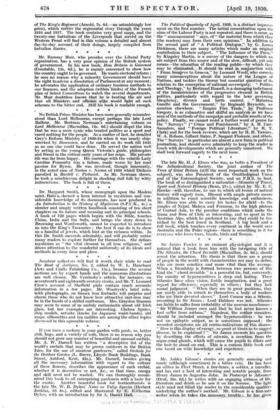Sir James Fowler is an eminent Physiologist and it is
natural that a book from him with the intriguing title of The Sthenies, the Chord Invisible (Macmillan, 3s. 6d.), should arrest the attention. His thesis is that there are a group of people in the world with characteristics not easy to define, who are niore sensitive and more vital than the -average. When a' friendship is formed between two- persons of this kind the "chord invisible" is a powerful tie; but, conversely, the enmity of hypersensitives is deep and' lasting. These Sthenics have clear vision, fertile imagination, and a great regard for efficiency, especially in others ;„ but they lack sound jadgment. When they are in great positions, they are rarely able to attach to themselves a bcidy of workers Who are, their devoted slaves." • Lord Curzon was a Sthenie, according to Sir James; Lord Haldane was not. Sthenics are liable to suffer-from irritability of the mucous membranes : "Sir William Jenner once said that he had never known a fool suffer from asthma." Napoleon; the author considers, should be .included -amongst the -hypersensitive:s : -he was not an epileptic subject, as is sometimes supposed ; the recorded symptoms are _all Contra-indications of this disease.
How is this display of energy, so great at times Os to suggest disease, to be explained ? Sir James answers his question by describing the effects of adrenin, a Secretion from the supra-renal glands, which will cause the pupils to dilate and the hair to stand on end. This is a curious little book and 'one based on wide knowledge and experience.
* * * *










































 Previous page
Previous page